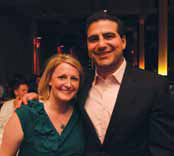 David Wolfe, who just finished a stint as chair of the American Bar Association’s Young Lawyers Division (YLD), was in town for the ABA’s annual meeting in August. We quizzed the New Jersey real estate lawyer on some of the big issues facing lawyers stateside and on the perils of sharing a practice with your identical twin.
David Wolfe, who just finished a stint as chair of the American Bar Association’s Young Lawyers Division (YLD), was in town for the ABA’s annual meeting in August. We quizzed the New Jersey real estate lawyer on some of the big issues facing lawyers stateside and on the perils of sharing a practice with your identical twin.
There’s been media coverage recently about a perceived crisis in law school reporting in the U.S. Is this an issue for the YLD?
Absolutely. We need statistics that give potential students a real picture of the earning and employment potential at a particular law school. Historically, they didn’t distinguish between temporary and full-time jobs, or jobs that required a law licence as opposed to those that didn’t. There were also issues with using average salaries that were distorted by a handful of very highpaying jobs.
At a midyear meeting in Atlanta, the YLD passed a resolution called the “Truth in Law School Education” resolution, which calls upon our law schools to provide more details and transparency. The resolution also calls upon the ABA’s Section of Legal Education to mandate that the law schools collect this information and make it readily available. I’ve heard that the average salary of a lawyer starting out in New Jersey is $55,000. The question is, do you want to go to law school and incur major debt to graduate to accept a position that pays that kind of salary?
So the issue is whether there are enough jobs for the number of new lawyers?
The economic downturn disproportionately impacted young lawyers, and those graduating from law school probably bore the biggest brunt of the impact. Students need to have a realistic understanding of their earning potential. Most of them aren’t going to start out earning $165,000 on Wall Street.
What’s one thing you want to make sure everyone knows about the YLD?
I’d like to stress the importance of providing public service through the organized bar. For example, we have a memorandum of understanding with FEMA, the federal agency for managing disasters, so whenever there’s a nationally declared disaster, the YLD ensures that there are free legal services available to disaster victims. It’s rewarding for volunteers, and its a great thing for our communities.
You have a twin brother who practises at the same firm. Has that been challenging, rewarding, or a bit of both?
I’d say it’s certainly been a bit of both. Especially when we come to meetings like this. When a person meets one of us, and then the other one later walks by without saying, “Hello,” the person wonders, “Why is this Wolfe kid so rude?” Now we just say “hello” to everybody.

